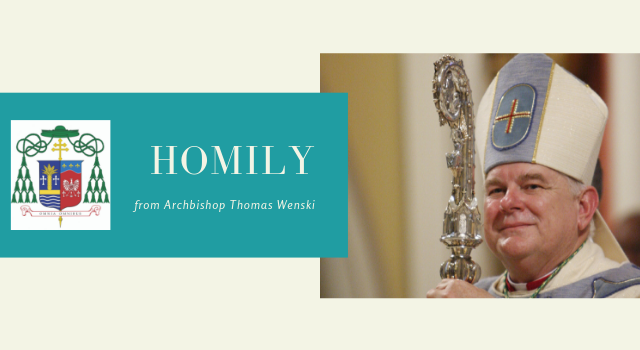By Archbishop Thomas Wenski - The Archdiocese of Miami
Archbishop Thomas Wenski preached this homily at the annual Migration Mass, which he celebrated Jan. 9, 2022, at St. Mary Cathedral in Miami.
This year we celebrate our Migration Day Mass on the Solemnity of the Baptism of Jesus. This year’s theme, “Towards an ever wider ‘we’” is taken from Pope Francis’ latest encyclical, Fratelli Tutti, and serves to connect this feast of the Baptism of Jesus with last week’s feast of his Epiphany.
At last Sunday’s Mass, we sang, “Lord, every nation on earth will adore you.” Those nations were represented by the Magi who came to worship the Christ Child in Bethlehem. Today, in the Cathedral, people from some of the many nations that make up this local Church here in South Florida come to adore the Lord who came among us as a light for the world, the light for the nations.
Epiphany – which means “manifestation” or revelation – celebrated the fact that when Jesus was born as a man in Bethlehem, he came not for just one people but for all peoples, all races – of all times and places.
Today’s feast, the Baptism of Jesus, is really another Epiphany or Revelation: for in going into the waters of the Jordan, God’s beloved Son wishes to reveal or manifest his solidarity with the entire human race; he comes as a brother to all.
As brothers and sisters of Jesus, we should no longer think in terms of “them” and “those”, but only “us”. The Church is to carry out the mission entrusted to the Apostles by Jesus Christ, “Go and teach all nations.” To do this, we must all work together to make the Church become ever more inclusive so that the Body of Christ is an “ever wider we” embracing everybody, building community in diversity, and unifying differences without imposing a depersonalized uniformity.
St. Peter tells us in today’s second reading: “In truth, I see that God shows no partiality. Rather, in every nation whoever fears him and acts uprightly is acceptable to him.”
Jesus in calling us to communion with his Father through the gift of his Spirit does not demand of us that we change our culture, our language or even our nationality: He only asks that we change our hearts. If the Church is the Father’s House, then all those who are God’s children through baptism should feel at home in their Father’s House.
God shows no partiality but sometimes we do. We like our own kind, and we mistrust or are suspicious of the one whom we see as the stranger, as “them” or “those.” Diversity – rather than being seen as a gift – is feared and often blamed for our divisions.
But what divides us is not our diversity. What divides us is sin.
Fratelli Tutti, Pope Francis, reminds us. We are all brothers and sisters and thus the world must move beyond thinking in terms of “them” and “those” and move to an ever greater “we”. This universal “we” must become a reality – first in the Church which is called to cultivate communion in diversity. It is the Church, the Church that is Catholic – that brings into its communion people of every race, language, and culture – that must teach the world how to live as brothers and sisters.
If we, Catholics, are to be a light to the nations we must model – in the way we live in our families, in our communities and in our parishes – what a reconciled world looks like.
One of the signs of our times is “globalization” – in itself, globalization is neither good nor bad. That depends on what we make of it. But in a globalized world, goods and merchandise made in one continent are bought and sold in another, half a world away; information and money can cross borders in an instant; and, in a globalized world, so can viruses. Globalization has shrunk the world – and made us neighbors; but it hasn’t made us “brothers and sisters.”
And one of the big realities of globalization is that people also increasingly move across borders – often in dramatic ways.
In light of the Epiphany of the Lord, which teaches that salvation is for everyone, and considering the Baptism of the Lord, in which Jesus shows his solidarity with humanity, the Church teaches us not to fear the migrant – and the Church warns us not to mistreat the migrant.
This is why the Church will continue to speak out on behalf of migrants everywhere. We will continue to advocate on their behalf and urge our public officials that magnanimity rather than mean-spiritedness is a best practice in resolving our immigration problems.
Today the presence of so many ethnic groups that form part of our archdiocesan community should be a witness that all can and do find a home in the Catholic Church. Our diversity of languages, cultures, and races gives witness to the “catholicity” of the Gospel message of salvation and its call to solidarity.
This diversity does not divide the Body of Christ – it enriches it. Our unity is not founded on race or language or nation of origin – rather it is founded on Christ.
We acknowledge one Lord, one Faith, one Baptism.

